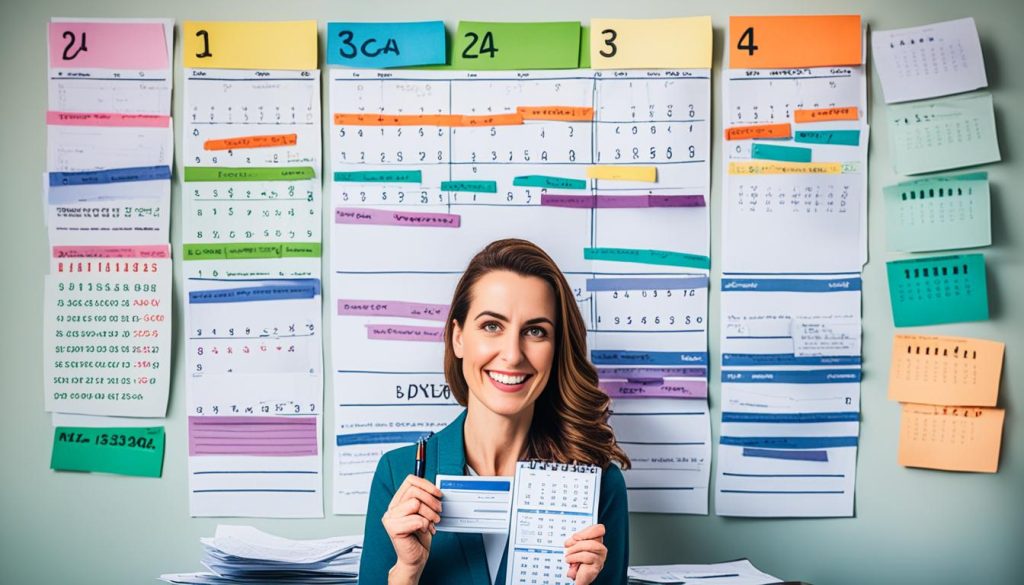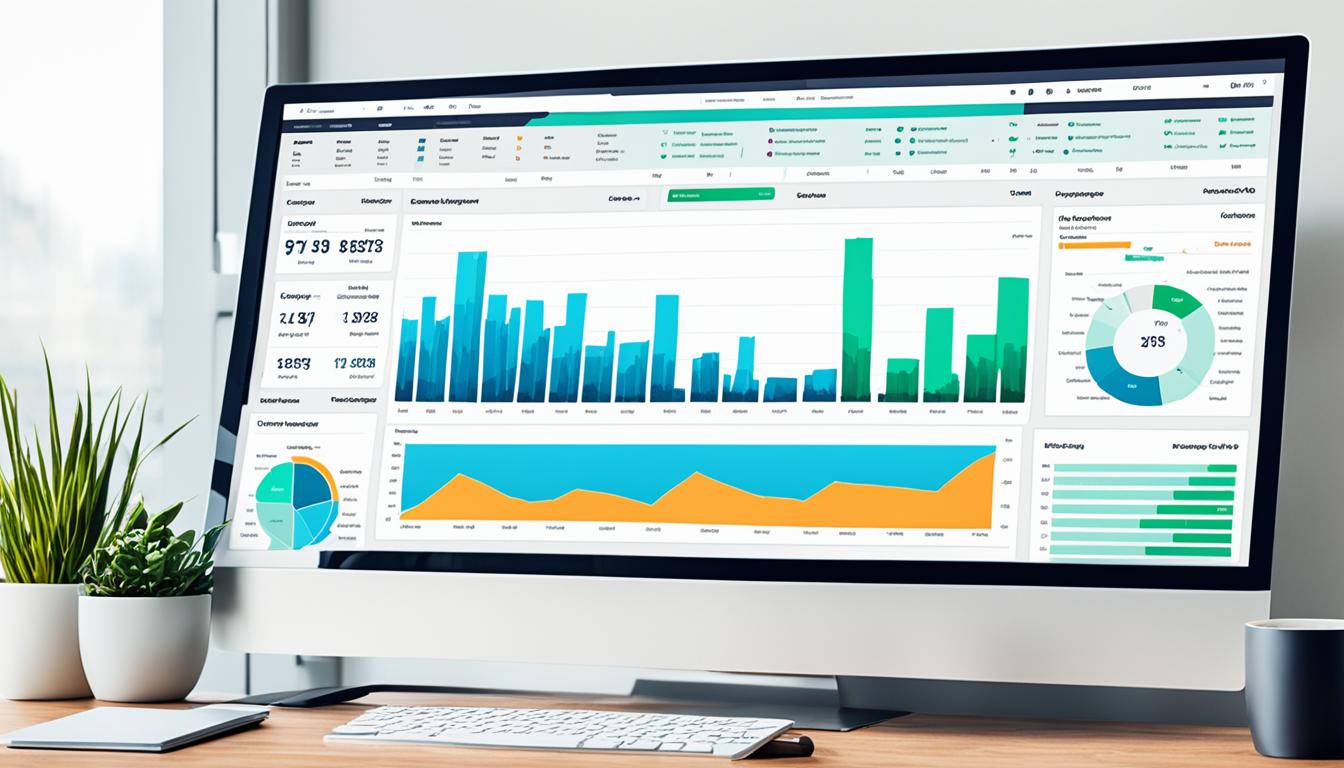Improving personal finances starts with effective money management. From tracking spending to creating a realistic budget and building up savings, taking control of your financial situation is essential. But where do you begin? Finding the best tool to manage personal finances can be the key to making the process easier and more efficient.
Key Takeaways:
- Tracking spending is crucial for better money management.
- A realistic budget helps align your spending habits and income.
- Building up savings provides financial security for the future.
- Paying bills on time avoids late fees and improves credit scores.
- Cutting back on recurring charges frees up more money for other needs.
Track Your Spending to Improve Your Finances
Tracking your spending is a crucial step in improving your finances. By monitoring where your money goes, you gain valuable insights into your spending habits and can identify areas where you can cut back and save. A great tool to aid you in this process is MoneyTrack, a user-friendly money management app. With MoneyTrack, you can effortlessly track your expenses and gain a clear understanding of your financial habits.
Using MoneyTrack allows you to effortlessly categorize your expenses and visualize your spending patterns. With just a few taps, you can see how much you’re spending on different categories like groceries, dining out, entertainment, and more. This comprehensive view helps you identify areas where you may be overspending and where you can make adjustments to improve your finances.
Being aware of your spending habits is the first step towards better financial decision-making. With MoneyTrack, you can set spending limits for different categories and receive notifications when you’re approaching those limits. This feature helps you stay on track and make conscious choices about your spending.
One of the key advantages of using MoneyTrack is the ability to generate detailed spending reports. These reports give you a clear overview of your financial activities, allowing you to identify trends, track progress towards your financial goals, and make informed decisions. This level of visibility and analysis is instrumental in improving your finances over time.
With MoneyTrack, tracking your spending becomes a seamless part of your daily routine. The app provides a user-friendly interface that is accessible on both mobile devices and desktop computers. Whether you’re on the go or at home, you can effortlessly log your expenses and stay in control of your finances.
In conclusion, tracking your spending is essential for improving your finances. With the help of a powerful tool like MoneyTrack, you can gain insights into your spending habits, make smarter financial decisions, and work towards achieving your financial goals. Start using MoneyTrack today and take control of your financial future.
Create a Realistic Monthly Budget
Creating a realistic budget is a fundamental step in effective money management. It serves as a guiding tool for better financial habits and helps individuals prioritize their spending. By aligning the budget with their lifestyle and spending habits, people can create a sustainable plan that supports their financial goals.
Why is a realistic monthly budget important?
A realistic monthly budget allows individuals to gain a clear understanding of their income and expenses. By tracking their spending, they can identify areas where they can cut back and save money. This budgeting practice helps people avoid living beyond their means and achieve financial stability.
“A budget is telling your money where to go instead of wondering where it went.” – John C. Maxwell
Creating a budget involves the following steps:
- Analyze your income: Start by evaluating your take-home pay and any other sources of income you may have. This includes wages, freelancing gigs, or investment returns.
- Track your expenses: Keep a record of your monthly expenses to understand where your money is going. Categorize your spending into essential and non-essential expenses.
- Set financial goals: Determine your short-term and long-term financial goals, such as saving for a down payment or paying off debt. These goals will help you allocate funds in your budget accordingly.
- Affordability assessment: Evaluate your spending habits and prioritize your needs over wants. Assess whether your current expenses align with your financial goals and make adjustments if necessary.
- Create spending categories: Divide your expenses into categories such as housing, transportation, groceries, debt repayment, entertainment, and savings. Allocate a realistic amount of money to each category.
- Monitor and adjust: Regularly review your budget and make adjustments as needed. Track your progress to ensure you are staying within your spending limits.
Benefits of a realistic monthly budget
A realistic monthly budget offers several advantages:
- Financial clarity: By creating a budget, you gain a clear understanding of your financial situation and can make informed decisions about your spending.
- Control over your money: A budget empowers you to take control of your finances and avoid unnecessary debt or overspending.
- Debt reduction: By allocating funds to debt repayment in your budget, you can gradually reduce your outstanding debts and work towards financial freedom.
- Savings growth: Prioritizing savings in your budget allows you to build an emergency fund, save for future goals, and create a financial safety net.
Creating a realistic monthly budget is a proactive step towards improving your financial well-being. It provides you with the foundation to make informed financial decisions and achieve your financial goals.
Sample Budget Template
| Category | Allocated Budget | Actual Spend |
|---|---|---|
| Housing | $1,200 | $1,100 |
| Transportation | $300 | $280 |
| Groceries | $400 | $380 |
| Debt Repayment | $200 | $220 |
| Entertainment | $150 | $170 |
| Savings | $300 | $320 |
| Other Expenses | $250 | $230 |
| Total | $2,800 | $2,700 |
Remember, a budget should be flexible and adaptable to changing circumstances. Regularly review and adjust your budget to ensure it continues to meet your financial objectives.

Build Up Your Savings
Building up savings is a key component of effective personal finance management. It allows individuals to have a safety net for unexpected expenses and reduces the need to rely on borrowing at high-interest rates. By making regular contributions to savings, individuals reinforce the habit of saving and strengthen their financial security for the future.
Creating an emergency fund is an essential step in building up savings. An emergency fund provides a safety net that can be tapped into during unexpected financial emergencies. It serves as a cushion to cover expenses such as medical bills, car repairs, or unexpected job loss. By having an emergency fund, individuals can avoid the stress and financial strain that comes with having to rely on credit cards or loans.
Creating an emergency fund starts with setting a savings goal. Determine how much you would like to have in your emergency fund and work towards that goal by making regular contributions. It is recommended to save three to six months’ worth of living expenses in an emergency fund.
Making regular contributions to savings is crucial in order to build up your savings over time. Set aside a percentage of your income each month towards savings, treating it as a non-negotiable expense. Automating your savings contributions can help ensure consistency and make it easier to achieve your savings goals.
In addition to building up your emergency fund, it is also important to have separate savings accounts for specific goals. Whether it’s saving for a down payment on a house, a dream vacation, or a new car, having specific savings accounts can help you stay focused and motivated to reach those goals.
Remember, building up your savings is a journey that requires consistency and discipline. Start small if you need to and gradually increase your contributions as you build momentum. Over time, you will see your savings grow and your financial security strengthen.

Having an emergency fund and building up savings not only provides financial security but also gives peace of mind. It allows you to navigate unexpected financial challenges without derailing your long-term financial goals. By prioritizing savings and making it a regular habit, you are taking control of your financial future.
Pay Your Bills on Time Every Month
One of the simplest yet most effective ways to manage your money wisely is by paying your bills on time. Not only does this help you avoid late fees, but it also ensures that you prioritize your essential spending. By taking the time to pay bills on time each month, you can maintain better control over your finances and avoid unnecessary financial stress.
When you neglect to pay your bills on time, you risk incurring additional fees and penalties that can quickly add up. Late payments can also have a negative impact on your credit score, making it harder for you to secure loans or credit cards at favorable interest rates. By consistently managing your money wisely and paying your bills on time, you can build a strong on-time payment history and boost your creditworthiness.
“By consistently managing your money wisely and paying your bills on time, you can build a strong on-time payment history and boost your creditworthiness.”
Having a solid payment history demonstrates to lenders and creditors that you are a responsible borrower, making it more likely for them to offer you lower interest rates and better loan terms. It can also open doors to other financial opportunities, such as getting approved for a mortgage or qualifying for a lower insurance premium. By being diligent and staying on top of your bills, you have a better chance of achieving your long-term financial goals.
To effectively manage your bill payments, it’s essential to create a system that works for you. Consider setting reminders on your phone or using online bill payment services to ensure that you never miss a due date. You can also automate your payments to make the process even more convenient. By adopting these habits and prioritizing paying bills on time, you’ll be on your way to achieving financial stability and peace of mind.
Advantages of Paying Your Bills on Time:
- Avoidance of late fees and penalties
- Improved credit score and creditworthiness
- Access to better loan rates and terms
- Opportunities for financial growth and stability

Image: Paying bills on time to manage money wisely
Cut Back on Recurring Charges
When it comes to managing your personal finances, one important step is to review and cut back on recurring charges and unnecessary subscriptions. These charges can often go unnoticed, but they can add up to a significant amount each month, consuming a large portion of your budget. By identifying and eliminating these unnecessary expenses, you can free up more money for saving, investing, or other essential needs.
Many people unknowingly subscribe to services they don’t use regularly, such as streaming services, fitness apps, or monthly subscription boxes. These charges are often automatically deducted from your bank account or credit card, making it easy to overlook them. Without regularly reviewing your statements, you may continue to pay for services that no longer align with your needs or interests.
Start by taking a close look at your bank or credit card statements and identifying any recurring charges. Pay attention to the services or subscriptions you no longer use or derive value from. Are there any streaming platforms you no longer watch? Are there subscription boxes that just accumulate clutter in your home?

Once you have identified the unnecessary subscriptions, take action to cancel them. Most services provide an option to cancel online or through their customer support. Make sure to save any confirmation emails or cancellation numbers for your records.
By eliminating these recurring charges, you can save a significant amount of money each month. This freed-up cash can be redirected towards building your savings, paying off debt, or investing for the future. Additionally, reducing your expenses can help you develop healthier financial habits and a more mindful approach to spending.
“Cutting back on recurring charges is like giving yourself an instant raise. It allows you to take control of your finances and allocate your hard-earned money towards your financial goals.”
– Financial Expert, Amy Johnson
Save Up Cash to Afford Big Purchases
When it comes to making big purchases like buying a house or a car, saving up cash can be a more cost-effective option than relying on loans or debt. Although certain types of financing can be beneficial, paying in cash eliminates interest charges and provides more financial flexibility. By saving up cash, individuals can have better control over their finances and avoid unnecessary debt.
Saving up cash offers several advantages when it comes to affording big purchases. Firstly, it allows individuals to avoid paying interest, which can significantly increase the overall cost of the purchase. Paying in cash means there are no monthly loan payments to worry about, freeing up more money for other essential expenses.
Additionally, saving up cash provides an opportunity to accumulate interest in a bank account. By depositing the money into a high-yield savings account, individuals can earn interest on their savings over time. This allows their money to grow and potentially increase their purchasing power when it comes time to make the desired big purchase.
Moreover, saving up cash helps individuals maintain control over their financial situation. It allows them to avoid taking on excessive debt or financial obligations that can strain their budget. By taking the time to save, individuals can plan and prioritize their expenses, ensuring they can comfortably afford the big purchase without sacrificing their overall financial stability.
It’s important to note that saving up cash for big purchases may require discipline and patience. It may take some time to accumulate the necessary funds, depending on the size of the purchase and the individual’s saving capacity. However, by setting realistic savings goals and consistently saving a portion of their income, individuals can make progress towards their desired purchase.
In conclusion, saving up cash is a smart and strategic approach to afford big purchases. It eliminates interest charges, allows money to accumulate interest, and provides individuals with better control over their finances. By prioritizing saving and avoiding unnecessary debt, individuals can achieve their financial goals and enjoy the satisfaction of making big purchases without the burden of excessive financial obligations.

Benefits of Saving Up Cash:
- Eliminates interest charges
- Provides financial flexibility
- Opportunity to earn interest on savings
- Maintains control over financial situation
- Avoids excessive debt
Start an Investment Strategy
Looking to grow your income and secure a stable financial future? Even with limited resources, starting an investment strategy can be a game-changer. By making small contributions to investment accounts, such as employer-offered 401(k) matching, you can make a significant impact on your long-term financial growth.
Opening a retirement account or other investment account is a wise step towards building wealth and achieving your financial goals. It allows you to take advantage of compounding returns and potential market growth, helping your money work for you over time.
Remember, investing is not just for the wealthy. With careful planning and the right investment vehicles, anyone can begin their journey towards financial prosperity. Don’t wait for a windfall or perfect timing – start your investment strategy today and unlock the potential to grow your income and secure a brighter future.




No comments! Be the first commenter?